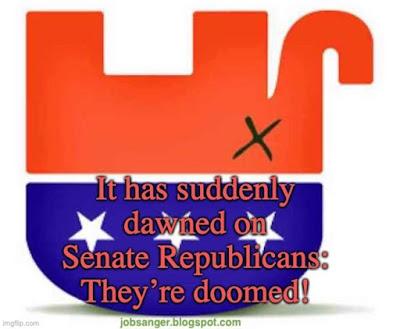 Republicans in Congress are getting worried. They were already in a very tenuous position, but the failure to come up with more help for unemployed and hurting workers is compounding their troubles
Republicans in Congress are getting worried. They were already in a very tenuous position, but the failure to come up with more help for unemployed and hurting workers is compounding their troublesThey now face an Election Day in which they are blamed for the nation's recession (and the pandemic). That could easily translate into an Election Day disaster for them.
The following is just part of a great op-ed in The Washington Post by Jennifer Rubin:
There is no deal yet between the White House and House Democrats on the stimulus bill, the Heroes Act, which the House passed more than two months ago. The Senate Republicans’ bill, finally rolled out last week, was so preposterously insufficient even President Trump called it “semi-irrelevant.”
Senate Republicans are so irrelevant they are not even participating in talks between the president’s representatives — White House Chief of Staff Mark Meadows and Treasury Secretary Steven Mnuchin — and House Speaker Nancy Pelosi (D-Calif.) and Senate Minority Leader Charles E. Schumer (D-N.Y.). That’s right: The Democratic minority leader is relevant; the Republicans are not.
That is because they have allowed the anti-government, anti-science Trump sycophants to disclaim any interest in the bill, thereby handing the reins to Democrats. Only recently does it seem to have dawned on Republican incumbents on the ballot three months from now that this is not a good place to be. CNN reports: “Republican senators are increasingly concerned over the state of stimulus negotiations on Capitol Hill. They’re frustrated over how long it is taking to reach an agreement and fearful that a deal may not come together at all as the country remains in crisis.”. . .
Let me suggest that Senate Republicans, angst-ridden over the failure to conclude a deal, should have taken action when Trump put his reelection above national security concerns; when he refused to hold Russia accountable for bounties on our troops; when he aired false, quack theories and contradicted expert advice; when he insisted on reopening states while the virus still raged; and when he held a rally endangering thousands of Americans. They could have removed him — rebuked him even or, at the very least, declared they would not vote for him in November — for any number of corrupt and malicious actions. Instead, they bet their careers and mortgaged their conscience to their political party.
Republicans are worried now? Hey, it is what it is.

